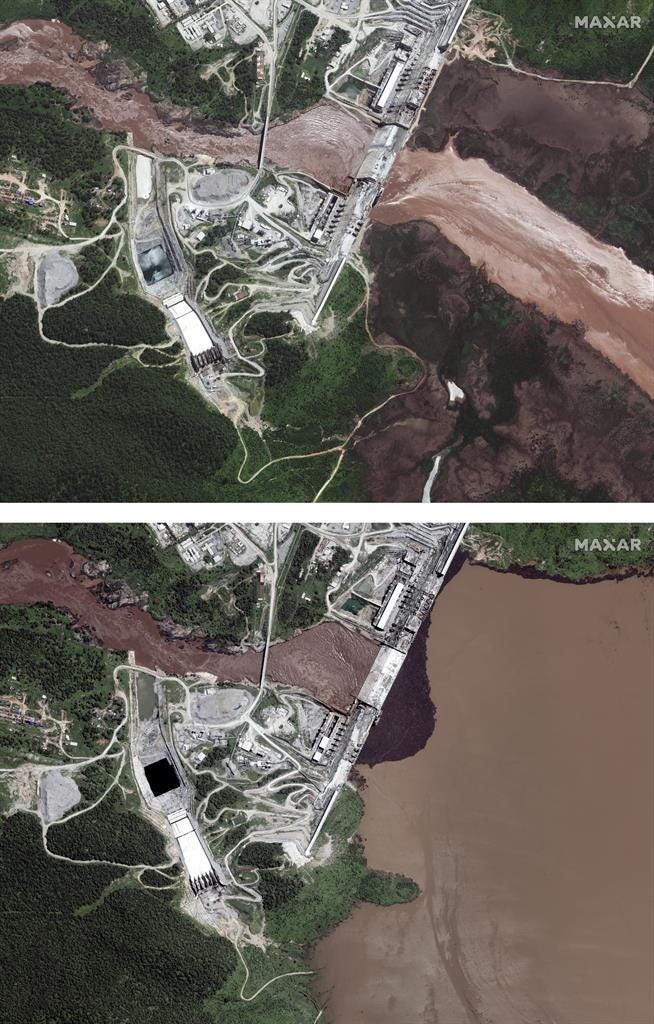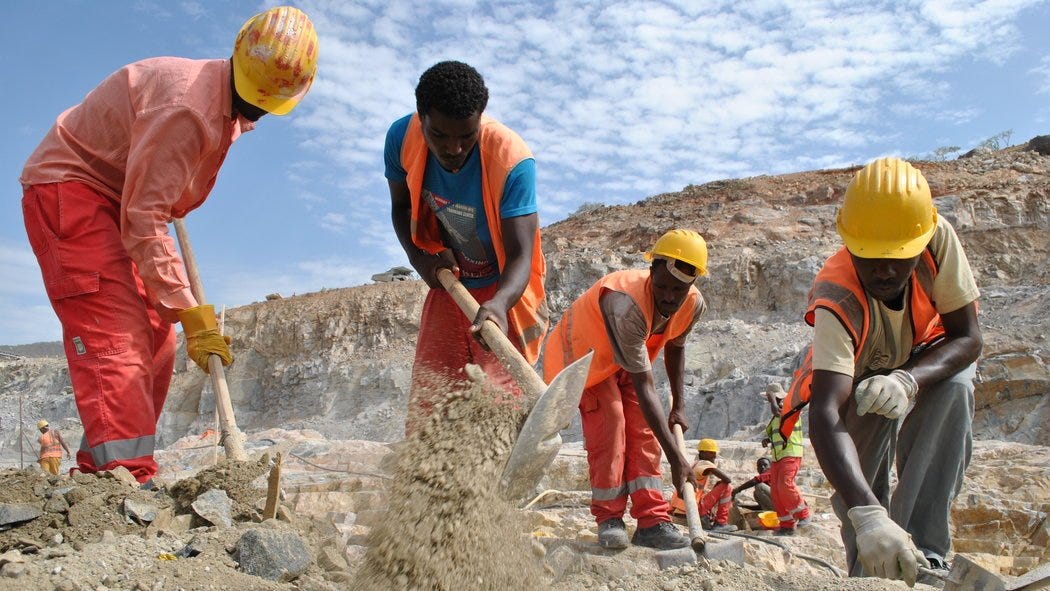The satellite images of the Nile are stark in contrast. Prior to this summer’s filling of the Grand Ethiopian Renaissance Dam (GERD), countries downstream from Ethiopia had unfettered access to the flowing waters of the Blue Nile. On 15 July, Ethiopian Prime Minister Abiy Ahmed announced that the GERD, a gravity dam under construction since 2011, had successfully reached its goal of a first filling. The reservoir to which Ahmed refers is the size of Greater London and is estimated to take at least five years to fill. Recent photos of this same area demonstrate reduced water-flow northward towards Sudan and Egypt where such a propitious collection of water for Ethiopia will necessarily prove devastating to the countries whose life depends on these waters, namely Sudan and Egypt. Ahmed’s announcement came just one day after leaders from Ethiopia, Egypt and Sudan met in a virtual summit and agreed to resume talks on the controversial dam.
Since it was revealed that the GERD is now holding back water and will contain an approximate 4.9 billion cubic meters (bcm) of the Blue Nile's water after this year’s rainy season, this struggle for water has put the region at risk of military conflict. In another four to six years the reservoir which sits behind the GERD is expected to reach 74bcm. The GERD, still under construction, will be Africa's largest hydroelectric plant when it comes into full operation with a price tag of $4.8 billion (€4.3 billion). It is expected to be completed in 2022 with the potential to generate 6,000 megawatts of energy meanwhile this first filling is said to provide enough water to test the dam’s first two turbines.
While both Sudan and Egypt have appealed to the United Nations earlier this year to stop the opening of the dam’s operations in July, little is mentioned in mainstream media about how this dam will necessarily compromise both countries’ food security. Take, for instance, the fact that Egypt depends upon the Nile for almost all of its water. When Egypt's Foreign Minister Sameh Shoukry states that this presents an existential threat to Egypt, there is no hyperbole. According to Shoukry, if there is a 2 per cent drop in the Nile’s flow this amounts to the loss of 100,000 acres of farming land and one million jobs lost.

During talks in June, UN Under-Secretary-General, Rosemary DiCarlo, stated via videoconference that “transboundary water cooperation is a key element in the implementation of the Sustainable Development Goals (SDGs),” noting that “climate change, combined with projected demographic growth and socio-economic changes, will increase water management challenges worldwide, not only for Blue Nile riparian countries.” How this will play out in the immediate future is yet to be seen as Egypt’s and Sudan’s worries of water poverty are backed up by data and IPoE studies that show the pros and cons of this project and which also call for further studies.
Viewed from the Egyptian perspective, by unilaterally filling the reservoir, Ethiopia is seeking to establish unfettered control over a transboundary river, a material breach of the 2015 Declaration of Principles signed by Egypt, Ethiopia and Sudan which stipulates that the filling and operation of GERD be in line with the guidelines and rules agreed between the three countries.
Still, the Ethiopian government is intent on moving forth with its plans to open all operations of the dam as scheduled even to the detriment of the loss of foreign aid. The US government-brokered talks between all three countries in February 2020 and as a result of the breakdown of the talks, the US is considering withholding aid to Ethiopia over the issue. All parties involved have referred to legal experts and ecological specialists who have attempted to balance historical treaties with current human rights and ecological demands.
Take for instance the fact that the GERD’s reservoir has the potential to hold 88 per cent of the mean annual flow of the Nile River when measured from Egypt’s southern border city, Aswan. It is reasonable that Egypt and Sudan show concern by this fact alone. But the subject grows in complexity as the GERD is located where it can dam the Blue Nile just before it leaves Ethiopia. This means that the Ethiopian government made a strategic decision to strategically control most of the Nile River freshwater that flows into Egypt and Sudan. It is estimated that this would directly affect the lives of over 140 million people in both countries.
Because of the GERD’s location and based on international environmental law principles that are precursors to the realization of human rights law, In fact, according to an excellent article on this situation by Egypt expert and water policy analyst, Amal Kandeel, the techno-legal process that should have guided the planning and implementation of the GERD since legally it is a transboundary project with international human rights and security consequences. Kandeel notes, “Ethiopia has been developing the GERD without engaging downstream countries in material issues that affect them or allowing them a full, independent evaluation of the GERD through Environmental and Social Impact Assessments (ESIAs),” adding, “ESIAs are one of the ABCs in applied international environmental law and customary development law, are required by law, and are most useful before a country develops any project that necessitates it.”
As of last Tuesday, Egypt, Sudan and Ethiopia have been engaged in renewed talks on the GERD that will continue until 7 November. Mediated by the African Union (AU) in an attempt to solve the ongoing dispute over the mega-dam it is unlikely after years of these talks that a decisive conclusion will be settled. The US, along with the EU and South Africa (the current president of the AU), has been observing the ongoing negotiations. Throughout a series of talks from last year until this July, Shoukry underscored that his country does not want punitive measures from the UN Security Council against Ethiopia.
Along with Sudan’s government, Egypt has expressed the desire to prevent any negative repercussions from the stalled Grand Ethiopian Renaissance Dam (GERD) negotiations and to move forward to discuss the water rights of all three countries. Egypt called on the UN Security Council in June intervene in the GERD dispute to help Egypt, Ethiopia and Sudan continue their negotiations, in accordance with international law. Each country has presented a draft agreement of its vision to the AU in a bid to find a compromise between all three countries. The AU has yet to decide on the matter despite tension growing between Egypt’s and Ethiopia’s governments.




